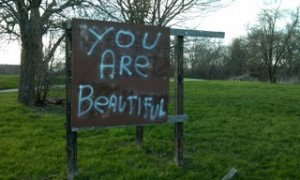Today is day 29 of the counting of the omer. It is the start of week 5. Can it really be five weeks since the Passover seders? Where did the time go. What is this week going to be about. The sefira we focus on is hod that gets translated as beauty or humility. Those are very different concepts. Today is about This morning I was driving down the road, having dropped my daughter off at work. It is a beautiful spring day and finally things are blooming. The world looks wonderful, colorful and full of promise.
I saw a sign, hand-painted on plywood with white paint, “You are beautiful.”
What does it mean to be beautiful? Why is it that so many people have a hard time seeing their own beauty (myself included). How do we convince people that they are beautiful?
Much has been written about girls who want to look like fashion models. I don’t need to repeat that here. If all people are created b’tzelem elohim, in the image of G-d, why can’t we be happy with the way we look? Why can’t we see ourselves the way G-d does, through the lens of lovingkindness? Or even the way the sign painter sees us, “You are beautiful”?
This beauty comes with a sense of humility. Hod comes from the Hebrew root hoda’ah, to give thanks. But it also means to acknowledge or to admit. How is this humility? It means admitting that there is something beyond ourselves, that we are not “full of ourselves.” As we yield, it is about making room for something more. It should not be confused with weakness or a lack of self-esteem. Lack of self esteem is what makes so many of those young girls not recognize their beauty.
It is about saying thank you to G-d. When I get up in the morning and recite, “Modah ahi” that is an act of thank you, praise and humility. When I read ee cummings,
i thank You God for most this amazing
day:for the leaping greenly spirits of trees
and a blue true dream of sky;and for everything
which is natural which is infinite which is yes
I am awed and humbled. When I stand on the bimah facing the ark and read the sign, “Da lifney atah omeid, Know before whom you stand”, even in the masculine formulation, that is an act of humility.
The mystics talked about tzitzum, about contraction. When we make space for something beyond ourselves that contraction is an act of humility. Humility is not compromise, it is the acknowledgement that there are some battles that we fight through the simple act of humility.
Humility is modesty. Moses was humble. (I almost didn’t become a rabbi over mistranslating that word, I said he was humbled!). Micah teaches us what G-d requires of us, “To justly, to love mercy and walk humbly with your G-d.” it is recognizing how small you are which allows you to realize how large you can become.
As I walk outside in this beautiful world today, may I recognize the beauty and the divine spark in everyone and may I be humble like Moses.

As a person blessed with good looks from birth, I have often had to humble myself. I try to operate from a place of gratitude, not just for my looks, but for all of the gifts G-d has given me. Seeing the beauty in others is a way of life, having attended an all-girls school where intelligence and talent were more valued than appearance. I had friends who were far from physically beautiful and still do. I choose my friends by what they are inside, and being a decent and caring human being is what matters above all. As for me, it’s a constant battle not to let my vanity take over. G-d made me the way I am, and I cannot take credit for my looks, talent, or intelligence; I can only be thankful for these gifts and try to use them in service to G-d and others–a lofty but difficult goal. Even as I write this, I know I might sound less than “modest” or “humble.” My mother was amazing in building my self-esteem, and I guess her support and encouragement at times went overboard. The dilemma remains, I guess. Thanks for your thought-provoking blog today.